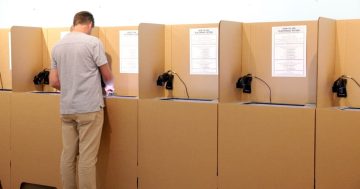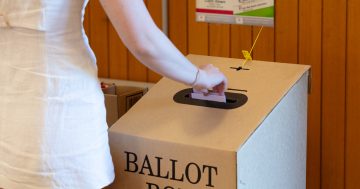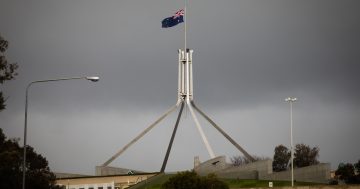
Voting in elections doesn’t matter as much as you think. Photo: Oliver Jacques.
The United States embraced Donald Trump, the ACT always votes Labor and Queenslanders flocked towards the conservatives.
There’s one thing the simplistic analysis of recent poll results ignores – electoral systems have more say on who forms government than voters.
You can’t say ‘the people have spoken’ after an election because of one simple truth. If you change the method of voting, you often change the outcome.
Take Australia’s 2022 federal election. It was widely reported as a rejection of the unpopular Morrison Government and an endorsement of Anthony Albanese’s opposition.
But Labor only received 32.58 per cent of the primary vote. More than two-thirds of Australians voted for someone else. If our country had the same voting system as the UK, the Coalition would have retained power.
Great Britain uses a first past the post system, where the candidate with the most votes in each seat wins. You only vote for the one person and you don’t give second and third preferences to other candidates, as you do here.
In most seats that Labor gained from the Liberals in 2022, they finished second but won thanks to preferences from the Greens and other minor parties. Hence, they benefited from the preferential system.
If federal elections were decided by proportional representational, as is the case for ACT local government polls, Labor would have fallen well short of a majority. In this system, the number of seats you gain is in line with your votes. One of the major parties would have needed to form a coalition with minor parties and/or independents to form government.
Hence, three different electoral systems would have produced three different federal election results.
Results of the recent ACT poll were also influenced by the way votes are counted.
ACT Labor had a swing against it of almost four per cent. If that had happened federally, it would’ve been seen as a substantial rebuke against the party. But they didn’t lose a single seat in Canberra because the Hare Clark system pretty much guarantees them two seats in each electorate – had their vote slid 8 per cent, the party may not have gone backwards.
At NSW council elections, we have both preferences and group ticket voting, where councillors can band together to pool votes. In Griffith Council, for example, candidates edged out others with much higher vote tallies because of the group with whom they chose to align. Once again, voters made their choice at the ballot box before the system took over to decide who was elected to council.
There are many other systemic features of elections that skew results. This includes whether voting is compulsory, as it is in Australia, or voluntary, like in the United States and most other countries.
The United States Midwest Political Science Association has argued that making voting mandatory benefits left-wing parties because the poor and less educated who would support these parties are less likely to vote if they’re not compelled to do so. There are times when only half the voting-age population exercise their right to vote in American elections, meaning the president can be elected by just a quarter of all adult citizens.
American journalist Jacob Soboroff also made the case that having a weekday election (on a Tuesday) in the United States impacts the results – as less well-off people are less likely to be able to take time off work to cast their ballot.
Some elements of the Democratic Party are also critical of America’s electoral college system, where every state is given a certain number of votes to elect a president based on their population. This means you can get thrashed in the big states and win a lot of small states narrowly, you can become president while losing the overall vote tally in the country – as Donald Trump did in 2016.
Trump’s win eight years ago led to a left-wing push for the Electoral College to be replaced by a simple nationwide popular vote result, which would have made Hillary Clinton the leader of the free world in that year.
Her supporters realised what everyone needs to know – who you vote for doesn’t matter as much as the system that determines which people vote, when they vote and how their vote is counted.




















